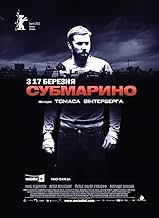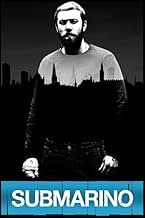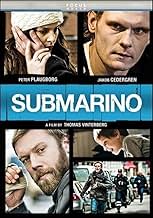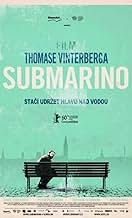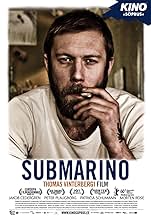IMDb रेटिंग
7.5/10
12 हज़ार
आपकी रेटिंग
अपनी भाषा में प्लॉट जोड़ेंTwo brothers meet at their mother's funeral, each in his way on a path of self-destruction, both haunted by a tragedy in their youth.Two brothers meet at their mother's funeral, each in his way on a path of self-destruction, both haunted by a tragedy in their youth.Two brothers meet at their mother's funeral, each in his way on a path of self-destruction, both haunted by a tragedy in their youth.
- निर्देशक
- लेखक
- स्टार
- पुरस्कार
- 10 जीत और कुल 19 नामांकन
Sebastian Bull
- Lille Nick
- (as Sebastian Bull Sarning)
Mads Broe Andersen
- Lillebror
- (as Mads Broe)
Lisbeth H. Pedersen
- Sagsbehandler
- (as Lisbeth Holm Pedersen)
Mei Oulund
- Drengenes mor
- (as Mei Oulund Ipsen)
Kristian Kirk Østergaard
- Tobias
- (as Christian Kirk Østergaard)
फ़ीचर्ड समीक्षाएं
Still involved in his preoccupations with collapse of family foundation and its bonds (as evident also in his fantastic Dogme 1, FESTEN), Vinterberg comes back to Berlin with a film which is not about love at all, but about misery in general. SUBMARINO is the story of lack of love, family and commitment which is reflected in addiction, despair and murder. Looking through a glass darkly at the depressed people in times of depression, it gains its strength from the constraint approach to the subject matter. In his usual personal visions (of course, without a trembling camera after his Dogme propaganda and anti-bourgeoisie pretense), Vinterberg finds his way through a way far from any sentimentality. Grey overtones in each shot marks the world he's going to portray – a world in which everyone has forgotten all about fear and trembling. However it seems too naturalistic, SUBMARINO is able to make a survey into the lives of miserable men of the third millennium, not as a tearjerker, but as a veritable mirror
Vinterberg has a great grip on playing out human drama. Even though the circumstances are extreme and might feel a tiny bit too much, I never felt the emotions displayed are overplayed or inauthentic. The subtleties of the main actors were very nicely used to convey dread as well as sympathy with the two brothers. All in all it felt like a roller-coaster of redemption-feelings, since with every chapter closed, yielding the actual redemption, another backside opened, inducing jarring unfinishedness, unansweredness, and despair.
I just had the honour to watch this Danish film at the Berlin Film Festival, and I have the feeling that this could be the winner. I don't want to give anything away, so I will be very general.
What we witness is the compelling story of two brothers divided by life, united by the same tragic event. Both adrift in their sorrow, they run down their self-destructive paths, with little to fight for.
It is no big drama, though. The narration is gentle and respectful, and leaves the audience in the position of not being able to judge the characters for their almost invariably wrong choices, but with a strong feeling of compassion for all of them.
The performances of the whole cast are extremely convincing (including the little boy playing Martin)and Vinterberg's direction - unlike his previous Dogma movies - is at the service of the disturbing realism of the story, working at the same time with a beautiful composition of the scenes (the cinematography, from the very first scenes, helps going straight to the soul). Chapeau.
A special praise has to go to the two actors playing the grown-up brothers. Jakob Cedergren (Nick) in particular makes us see the fragility of his character through his eyes, despite his apparent and imposing physical strength. But the whole cast is really credible all along, both with their physical appearance and their realistic acting.
This movie, with its realistic description of the consequences and the dynamics of substance addiction, destroyed families (what a critic to the Scandinavian society, where alcoholism is a devastating plague) should be screened in every high school.
And, let's say the truth: if you don't find yourself silently weeping in the last prison and church scenes, you most likely have no heart at all. I am fighting with my tears right now, just playing the movie in my mind again.
What we witness is the compelling story of two brothers divided by life, united by the same tragic event. Both adrift in their sorrow, they run down their self-destructive paths, with little to fight for.
It is no big drama, though. The narration is gentle and respectful, and leaves the audience in the position of not being able to judge the characters for their almost invariably wrong choices, but with a strong feeling of compassion for all of them.
The performances of the whole cast are extremely convincing (including the little boy playing Martin)and Vinterberg's direction - unlike his previous Dogma movies - is at the service of the disturbing realism of the story, working at the same time with a beautiful composition of the scenes (the cinematography, from the very first scenes, helps going straight to the soul). Chapeau.
A special praise has to go to the two actors playing the grown-up brothers. Jakob Cedergren (Nick) in particular makes us see the fragility of his character through his eyes, despite his apparent and imposing physical strength. But the whole cast is really credible all along, both with their physical appearance and their realistic acting.
This movie, with its realistic description of the consequences and the dynamics of substance addiction, destroyed families (what a critic to the Scandinavian society, where alcoholism is a devastating plague) should be screened in every high school.
And, let's say the truth: if you don't find yourself silently weeping in the last prison and church scenes, you most likely have no heart at all. I am fighting with my tears right now, just playing the movie in my mind again.
We see two separate but continuously interleaving stories of two brothers, each trying to cope with their daily lives, overall providing for a pessimistic view on their lives, riddled with drugs, violence, alcohol, bad housing circumstances, but at the same time trying to deal with their responsibilities like caring for a kid. The title of the film says it all: it stands for a method of torture, where someone is kept under water until he nearly drowns.
Though knowing no people living in similar depressing circumstances, casting and acting looked very convincing to me. Apart from that, we saw a sequence of events that kept us wondering what would happen next. All this resulted in a "page turner" experience, fundamental to a good movie.
Alternating between the stories of the two brothers was an extra bonus that made this film entertaining throughout. They each live their own separate lives, under circumstances that are very different but equally troublesome. Their respective paths cross each other in less than a handful of situations. Once you get a fix who the main characters are, this way of structuring two story lines works perfectly.
The film opens with a prologue, wherein two young boys imitate the baptism of a newly born child "just like they do in church". After that, the real story takes off, but I could not connect the dots at the point where the prologue moves on to the actual two story lines. Maybe I was not paying attention enough. I had to wait until the final scene before I understood. Regardless, it did not hinder my appreciation of the film as a whole.
Given all things happening you cannot expect everyone to live happily ever after. Nevertheless, the finale of the movie shows a moving scene under impressive musical tones, where even the toughest role players seem to show some tears. It may be intended by the film makers to leave us with an optimistic feeling after all, with some silver lining around the clouds.
Though knowing no people living in similar depressing circumstances, casting and acting looked very convincing to me. Apart from that, we saw a sequence of events that kept us wondering what would happen next. All this resulted in a "page turner" experience, fundamental to a good movie.
Alternating between the stories of the two brothers was an extra bonus that made this film entertaining throughout. They each live their own separate lives, under circumstances that are very different but equally troublesome. Their respective paths cross each other in less than a handful of situations. Once you get a fix who the main characters are, this way of structuring two story lines works perfectly.
The film opens with a prologue, wherein two young boys imitate the baptism of a newly born child "just like they do in church". After that, the real story takes off, but I could not connect the dots at the point where the prologue moves on to the actual two story lines. Maybe I was not paying attention enough. I had to wait until the final scene before I understood. Regardless, it did not hinder my appreciation of the film as a whole.
Given all things happening you cannot expect everyone to live happily ever after. Nevertheless, the finale of the movie shows a moving scene under impressive musical tones, where even the toughest role players seem to show some tears. It may be intended by the film makers to leave us with an optimistic feeling after all, with some silver lining around the clouds.
I don't get why they called this movie Submarino. I must have missed something or maybe I'm just too stupid to understand the pun. That said, it doesn't really matter as long as the movie is entertaining and that it was for sure. It's a Danish drama, about two brothers that grew up in a highly dysfunctional family, with an alcoholic mother that can only bothered by her next drink. The story is told in two parts, each part seen by the other brother. It isn't a happy movie, the desperation is overwhelming, but it's realistic, certainly for people living in big cities where these kind of things happen on a daily basis. I didn't know any of the actors but they all did a very good job playing their characters. Their acting made this movie worth watching.
क्या आपको पता है
- ट्रिवियाSubmarino is the name of a common torture method among the world's prisons, the prisoner is hanged upside down with the head inside a recipient full of water, feces, urine among other things. The movie takes this as a metaphor because all the characters are sunk into violence, alcoholism, drug addiction and twisted sex and, in those situations, is very difficult to breathe.
- कनेक्शनFeatured in DR2 Premiere: एपिसोड #4.1 (2010)
- साउंडट्रैकCirkeline har fødselsdag
Lyrics by Hanne Wernberg
Music by Hans-Henrik Ley (as Hans Henrik Ley)
Performed by Nanette, Maj Britt, Aske, Christian, Linda & Jens
© Dansk Tegnefilm Kompagni 1968
टॉप पसंद
रेटिंग देने के लिए साइन-इन करें और वैयक्तिकृत सुझावों के लिए वॉचलिस्ट करें
- How long is Submarino?Alexa द्वारा संचालित
विवरण
बॉक्स ऑफ़िस
- दुनिया भर में सकल
- $8,15,998
इस पेज में योगदान दें
किसी बदलाव का सुझाव दें या अनुपलब्ध कॉन्टेंट जोड़ें





